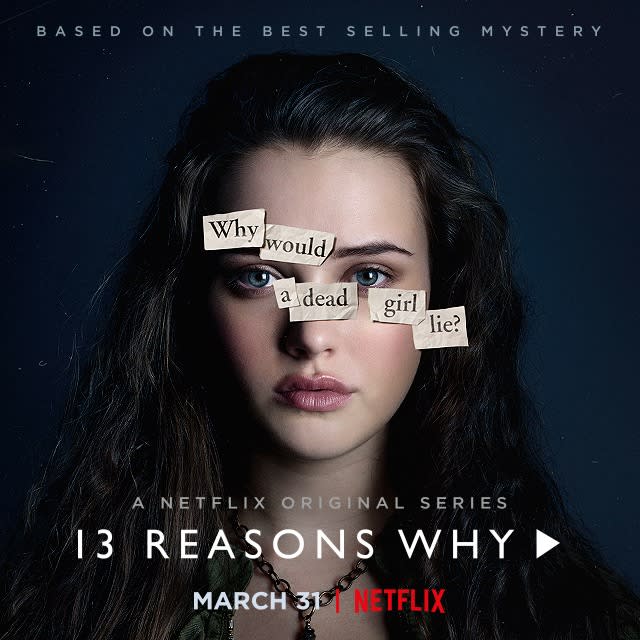'13 Reasons Why' author talks about rising teen suicide rates at Singapore Writers Festival

Jay Asher, author of the best-selling novel behind hit Netflix series “Thirteen Reasons Why”, said that teen suicides are on the rise due to the effect social media has on bullying.
His 2007 novel is about a young high school student who goes into an emotional spiral brought on by betrayal and bullying, ending with her suicide. She details the reason why she kills herself in cassette tapes mailed to a friend following her death.
Speaking with Yahoo Lifestyle Singapore at the Singapore Writers Festival on Sunday (12 November), Asher said that rising teenage suicide rates have risen with the advent of social media. “Previously if you’re having a hard time with other students at school, when you leave, you leave. But now, it goes on 24 hours a day,” said Asher.
In addition, he said that social media gives rise to stress, due to a fear of missing out on something when you’re not online. “Rumours spread online, and when you see somebody saying something about you online, there are more stresses and more ways to be bullied that we never had to deal with,” he added.
In Singapore, teen suicide rates are reportedly at their highest in 15 years while overall suicide rates have dipped. In 2015, twice as many young people aged 10 to 19 killed themselves. This contrasted with the overall reported suicided rate, which was at its lowest since 2012.
Asher, 42, who has been giving suicide awareness talks in the United States and Europe since the book was first published, noted this was not a phenomenon he had observed in other countries.
“A lot of it has to do with what’s going on; I don’t know about your economy or what’s changed in that time, but I know in the United States when the economy is bad, there is just more stress and more things people deal with, even among kids or teens who are not necessarily immediately affected. Their parents are really stressed and that affects them,” he said.
Due to the sensitive nature of the subject matter, the book and the eponymous show have stirred controversy. For example, in August, The Atlantic published a piece on how one of the biggest concerns among psychologists and educators was that the show might spark a contagion effect, where increased coverage of suicide in the media leads to a related increase in suicide attempts. Schools have also issued warnings about the book.
Asher disagreed with these. “Nobody watching the show would say ‘my life was great before and this show ruined me’. The show is reflection of things that are going on.”
According to him, the controversy and pushback surrounding the book and the popular Netflix series is making teenagers more wary about talking about suicide with adults.

Said Asher, “Teens are watching (the show); why take adults out of the equation? I keep telling my publisher, I want to write an article saying ‘America you’re really messing this up, you had the opportunity to talk about something that’s happening’. It’s not like suicide isn’t happening. You had a really easy opportunity to talk about this – and you’re saying ‘let’s not talk about it’.”
He shared that therapists have told him how teenage patients are sometimes convinced they cannot talk about these issues with an adult. However, when the therapist asks them to read “13 Reasons Why”, they know they can talk about the topic.
“Without that, he (or she) thinks they can’t trust adults and so many adults are proving they can’t be trusted,” Asher added.
He shared an incident during a talk soon after the controversy where he noticed a girl crying in the audience when he talked about the flak the book and TV series were receiving. The girl came up to talk to him afterwards and said she had seen the show and was really positively affected by it.
“Even though she still did not have the strength, she felt encouraged knowing it was up to her to get help. Then she sees the school district saying ‘don’t let your kids watch this’ and her parents saying she shouldn’t have watched it, so these people who she probably would have gone to talk to are saying ‘don’t come to us’. They didn’t say that, but it’s what she took it as,” Asher said.
He also saw similarities between the reaction towards his book and the recent response to Harper Lee’s classic “To Kill A Mockingbird” about race relations in 1930s America, where students in a junior high school in Mississippi could only read the book with parental consent.
“Its similar in the respect that they’re uncomfortable with the language, so rather than face up that this is the language that used to be used and sometimes, still is, let’s just not talk about it.”
His solution? “We need to talk about these things.”
Related stories:
‘13 Reasons Why’ Review: Netflix’s Teen Suicide Drama Powerful & Astute TV
Here’s why they decided to show Hannah’s suicide on “13 Reasons Why”
Follow Yahoo Lifestyle Singapore on Facebook.


